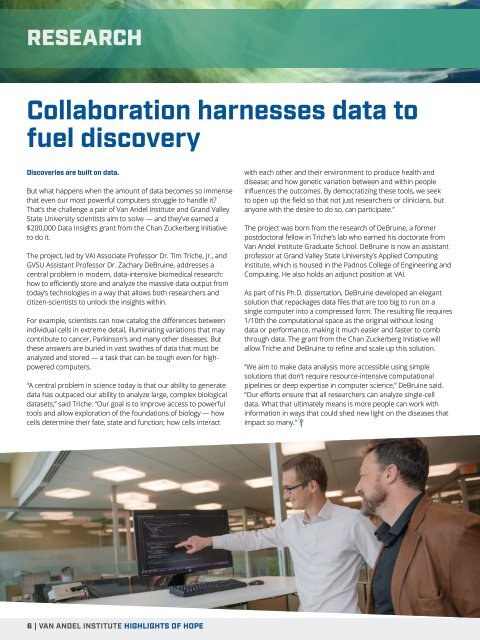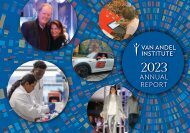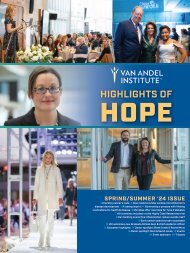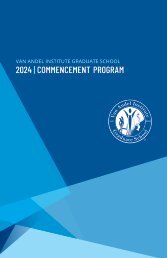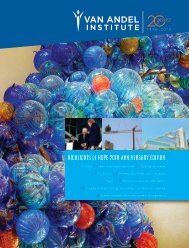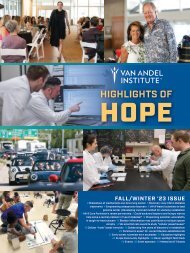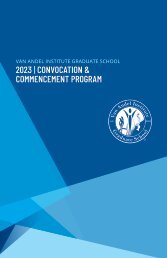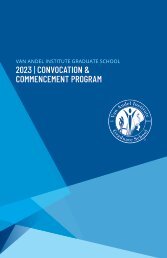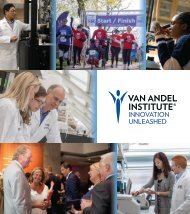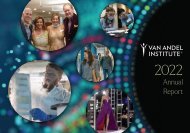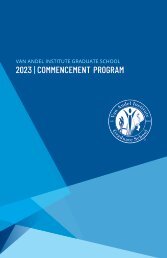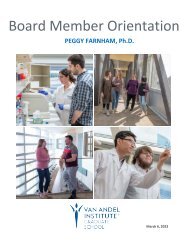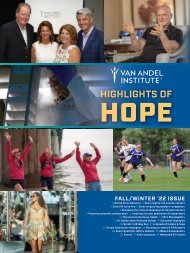Highlights of Hope Spring/Summer 23
This is the 2023 Spring/Summer edition of Van Andel Institute's Highlights of Hope donor publication.
This is the 2023 Spring/Summer edition of Van Andel Institute's Highlights of Hope donor publication.
Create successful ePaper yourself
Turn your PDF publications into a flip-book with our unique Google optimized e-Paper software.
RESEARCH<br />
Collaboration harnesses data to<br />
fuel discovery<br />
Discoveries are built on data.<br />
But what happens when the amount <strong>of</strong> data becomes so immense<br />
that even our most powerful computers struggle to handle it?<br />
That’s the challenge a pair <strong>of</strong> Van Andel Institute and Grand Valley<br />
State University scientists aim to solve — and they’ve earned a<br />
$200,000 Data Insights grant from the Chan Zuckerberg Initiative<br />
to do it.<br />
The project, led by VAI Associate Pr<strong>of</strong>essor Dr. Tim Triche, Jr., and<br />
GVSU Assistant Pr<strong>of</strong>essor Dr. Zachary DeBruine, addresses a<br />
central problem in modern, data-intensive biomedical research:<br />
how to efficiently store and analyze the massive data output from<br />
today’s technologies in a way that allows both researchers and<br />
citizen-scientists to unlock the insights within.<br />
For example, scientists can now catalog the differences between<br />
individual cells in extreme detail, illuminating variations that may<br />
contribute to cancer, Parkinson’s and many other diseases. But<br />
these answers are buried in vast swathes <strong>of</strong> data that must be<br />
analyzed and stored — a task that can be tough even for highpowered<br />
computers.<br />
“A central problem in science today is that our ability to generate<br />
data has outpaced our ability to analyze large, complex biological<br />
datasets,” said Triche. “Our goal is to improve access to powerful<br />
tools and allow exploration <strong>of</strong> the foundations <strong>of</strong> biology — how<br />
cells determine their fate, state and function; how cells interact<br />
with each other and their environment to produce health and<br />
disease; and how genetic variation between and within people<br />
influences the outcomes. By democratizing these tools, we seek<br />
to open up the field so that not just researchers or clinicians, but<br />
anyone with the desire to do so, can participate.”<br />
The project was born from the research <strong>of</strong> DeBruine, a former<br />
postdoctoral fellow in Triche’s lab who earned his doctorate from<br />
Van Andel Institute Graduate School. DeBruine is now an assistant<br />
pr<strong>of</strong>essor at Grand Valley State University’s Applied Computing<br />
Institute, which is housed in the Padnos College <strong>of</strong> Engineering and<br />
Computing. He also holds an adjunct position at VAI.<br />
As part <strong>of</strong> his Ph.D. dissertation, DeBruine developed an elegant<br />
solution that repackages data files that are too big to run on a<br />
single computer into a compressed form. The resulting file requires<br />
1/10th the computational space as the original without losing<br />
data or performance, making it much easier and faster to comb<br />
through data. The grant from the Chan Zuckerberg Initiative will<br />
allow Triche and DeBruine to refine and scale up this solution.<br />
“We aim to make data analysis more accessible using simple<br />
solutions that don’t require resource-intensive computational<br />
pipelines or deep expertise in computer science,” DeBruine said.<br />
“Our efforts ensure that all researchers can analyze single-cell<br />
data. What that ultimately means is more people can work with<br />
information in ways that could shed new light on the diseases that<br />
impact so many.”<br />
6 | VAN ANDEL INSTITUTE HIGHLIGHTS OF HOPE


